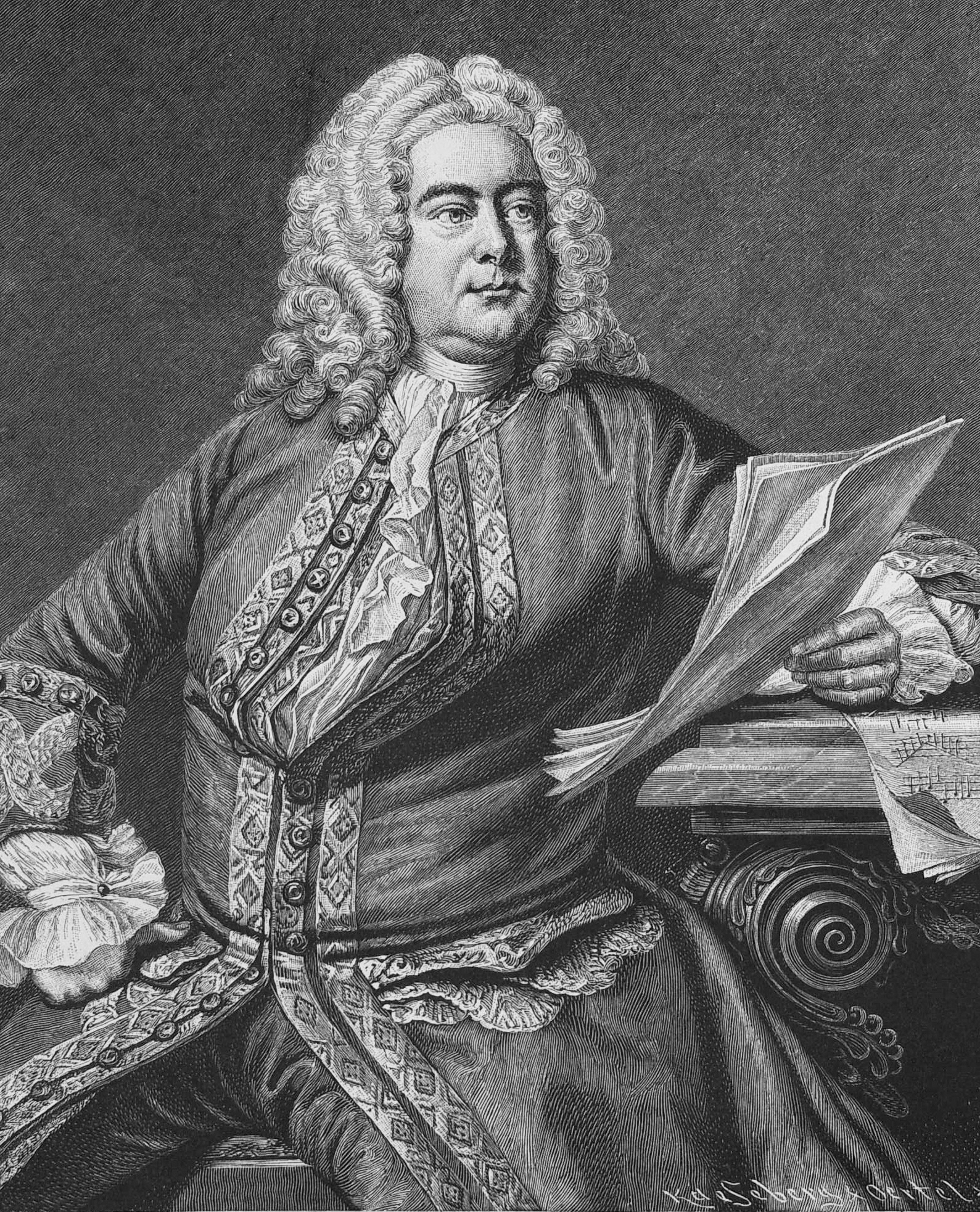Handel, George Frideric (1685-1759), was a German-born composer who is known today mainly through his musical compositions called oratorios. His famous oratorio Messiah is one of the most popular works in music. In the mid-1900’s, Handel’s operas, neglected for 200 years, gained recognition as at least equal in quality to his oratorios. Handel also composed much orchestral music, chamber music (music for small groups of instruments), and solo music for harpsichord.

His life.
Handel was born in Halle on Feb. 23, 1685. He began taking music lessons at the age of 7. By the time he was 12, he was assistant organist at the Halle cathedral. As a youth, he had a typical Lutheran education. He studied law at the University of Halle for a year. His earliest activity as a composer began in 1703 in Hamburg. At that time, the city was a center of French, Italian, and German operatic styles.
Between 1706 and 1710, Handel worked in Italy, becoming one of the most popular composers of Italian opera. He moved to England in 1712 and lived in London until his death. He is buried in Westminster Abbey.
Italian opera was still quite new to England when Handel arrived. It gained its greatest popularity among the nobility during his early years there. Then the flourishing middle class flocked to the English ballad operas. At the same time, the nobility turned to the lighter and often comic operas of the younger Italians.
Loading the player...Largo instrumental from Xerxes
In 1741, Handel abandoned opera and dedicated himself to composing oratorios. Messiah was the first of the oratorios that followed. In 1751, after completing Jephtha, Handel gave up composing because of blindness. But he remained active. He conducted a Holy Week performance of Messiah eight days before he died. He died on April 14, 1759.
His work.
The oratorio developed in Italy as a music drama to be played without staging in the oratory (meeting room) of a religious association. Singers represented characters in a Biblical story or in the life of a saint. In addition to the dialogue and songs of the singers, a narrator often filled in necessary details in the story. A chorus usually represented groups of people or crowds and reacted to the events.
Loading the player...Fugue by George Frideric Handel
Handel composed more than 25 oratorios throughout his career. His first, La Resurrezione (1708), was composed during his stay in Italy. It is the only one with an Italian text. In 1717, after settling in England, he turned again to the oratorio, writing to English texts. He based most of them on Biblical stories. Messiah is an exception. The text is a collection of quotations gathered by Handel’s friend Charles Jennens from the Bible. Messiah contains no dramatic action. It illustrates the foundations of Christianity in a series of musical numbers. The numbers parallel the prophecy of Christ’s coming, his birth, life, death, and resurrection.
The music of the solo singers in Handel’s oratorios was written in the manner of Italian opera of that time. The choruses often use the style of the sacred anthem. Most of Handel’s oratorios were first performed in theaters. Audiences paid admission as they would to an opera. Messiah was first heard in a theater in Dublin in 1742.
Loading the player...The Arrival of the Queen of Sheba
The main reason for the popularity of Messiah lies in its glorious choruses, which display a remarkable variety of mood and technique. “And the glory of the Lord” is a happy dancelike chorus. The voices come in and out casually and also join in resounding exclamations. In “And He shall purify,” the four voice parts take turns singing the theme. “O thou that tellest good tidings” recalls earlier English music. It particularly resembles the music of Henry Purcell in its melody, lightness, and good cheer. In “Surely he hath borne our griefs,” Handel portrayed grief with solemn rhythms and thick harmony. The thrilling “Hallelujah” chorus shows Handel as a master of choral effects.
Loading the player...Hallelujah Chorus
Saul (1739), Handel’s most dramatic oratorio, is more typical of Handel’s approach to the oratorio. Jennens’s words represent the conflict between Saul, king of Israel, and David, the youthful warrior who slew Goliath. The action develops during the sections of speechlike song called recitative. These sections are usually accompanied only by a harpsichord and violoncello. The characters express their anger, hope, love, delight, joy, and other emotions in lengthy arias (solos) accompanied by orchestra. The reasons for these emotional outbursts are brought out in the recitative. The two types of music alternate unless a chorus or symphony breaks in. The arias often rely on the da capo formula. In this formula, the first section, based on one theme, returns after a middle section based on a similar or contrasting theme.
Few of the choruses of Saul are of the meditative, anthemlike variety of Messiah. They tend to be shorter and more direct. Like the chorus of Greek tragedy, they provide emotional reactions to dramatic events. Sometimes they point out a moral.
Loading the player...Royal Fireworks Music
Handel’s more than 40 operas were mostly written before Saul. Modern productions of his operas Julius Caesar (1724), Orlando (1733), and Alcina (1735) demonstrate that they are still stageworthy and appealing, filled with melodic invention and emotional variety. They have earned Handel a place among the world’s great dramatic composers.
Handel wrote more than 150 instrumental compositions. The best known of these include two orchestra suites, Water Music (about 1717) and Royal Fireworks Music (1749). Handel composed many harpsichord suites, organ concertos, and sonatas for chamber groups. He also wrote a number of concerti grossi. These are compositions that feature a small group of soloists with a string orchestra.
Loading the player...Water Music by George Frideric Handel
See also Messiah.
